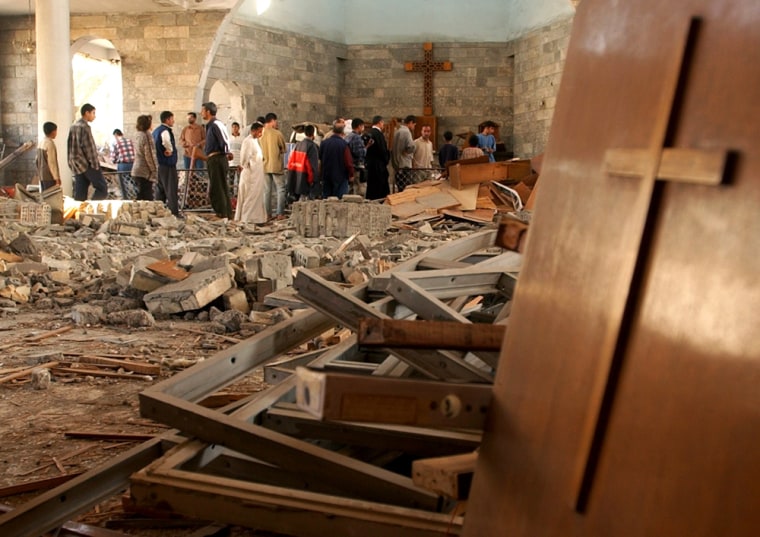Father Daniel Hani silently prayed in the front pew at Saint Joseph’s Cathedral in downtown Baghdad. These are particularly trying times for Christians in Iraq, and Hani knows that more than most.
He's aware of the empty pews behind him, pews that would have been filled just two years ago. Attendance is visibly down, even though most churches have reduced the number of weekly services.
"It's a matter of fear," he said, referring to the two-thirds drop in attendance at St. Joseph's. "A lot of Christians are trying to get out of the country."
Fear is forcing many Iraqis — of all backgrounds — to flee. Every morning a heaving crowd pushes toward the front window of the Baghdad passport office. It seems like anyone who can afford it is applying for a passport and trying to leave. A half million passports have been issued since June.
Targets
Under Saddam Hussein too, Iraqis tried to leave, but after he was toppled from power in April of last year, the tide of emigrants was supposed to turn. It hasn't, and it's not surprising considering the bombings and kidnappings that have become a horrifying part of daily life.
Iraq's Christians say they're high on the target list. While Christians comprise only 3 percent of Iraq's 25 million people, the Christian community is one of the oldest in the Middle East and has long played an important role in Iraqi politics, society and the economy.
On Monday, Pope John Paul II met with Albert Edward Ismail Yelda, Baghdad’s new envoy to the Vatican, and expressed deep concern for religious freedom in post-Saddam Iraq, where Islamic militants have bombed several churches, spreading fear among the minority community.
“May your government work untiringly to settle disputes and conflicts through dialogue and negotiation, having recourse to military force only as a last resort,” the pope implored in his written address accepting the credentials of Yelda.
“It is my hope that the Iraqi people will continue to promote their long tradition of tolerance, always recognizing the right to freedom of worship and religious instruction.”
Targeted as purveyors of Western vice
Christian community leader William Warda rummaged through a pile of papers on his desk. Since the end of Saddam's rule, Warda has been keeping scrupulous records of the attacks. From the mass of papers he plucked out a list containing names, locations and dates.
"More than 200 Christians have been kidnapped," he said, "and though my census is still incomplete, at least 60 of them have been murdered."
He turned back to the pile on the desk and pulled out four glossy 8-by-10-inch color photographs. They showed the bloodied bodies of a young boy and girl, sprawled on the kitchen floor of their home. They were a sister and brother, said Warda, shot to death by radical Islamists because the children’s father ran a liquor store.
Christians are targeted for a number of reasons. The fact that they operate liquor stores and beauty salons, anathema to radical Islamists, marks them as an obvious target. But more broadly because they are perceived as being comparatively well off — solidly middle class — and as such, easy targets for kidnapping rings.
They are also targeted because they are seen as being staunch supporters of the American-led invasion last year, and even now many work with the international coalition.
Scapegoats of religious extremists
Middle East analyst Jonathan Paris said Iraqi Christians are a vulnerable minority, the scapegoats of religious extremists.
"Christians are deemed to be crusaders — part of the alliance with the Americans and the British who are occupying Iraq — so the Christians are uniquely targeted by the Islamists, by the radical extremists for being associated somehow with the American occupation," Paris said.
It's not just individuals who are being targeted, but places of worship as well. The first Sunday in August is a day seared into the minds of Iraqi Christians as five churches were simultaneously bombed, leaving 11 dead and more than 50 wounded. Since then, a half-dozen more churches have been bombed.
Many priests are reluctant to speak publicly, fearful of attracting unwanted attention and concerned about contributing to the Christian exodus. Hani said the church is trying to support parishioners, whatever their decision.
"Our country is part of our identity — it's how we identify ourselves. And if Iraq loses its Christians, then Iraqi civilization loses a lot,” said Hani.
Exodus continues
Iraq's Migration Minister Pascale Isho Warda has said at least 40,000 Christians have fled the country since the U.S. invasion. Most have gone to neighboring Jordan and Syria, and from there they hope to get to Europe, the United States and Canada.
Among those trying to get out is a dentist with a particularly painful experience. He had a relative kidnapped, a friend killed and his nephew beheaded — a murder that was posted on an Islamist Web site.
The dentist's wife urged him not to speak to the media, fearful of retaliation and for the safety of his two young children. But he told us he felt obligated to speak out, on the condition that he was not identified, about what he described as the nightmare of life in his country.
"I love Iraq, but what can I do? We cannot live in this country anymore. We will leave it to the terrorist."
